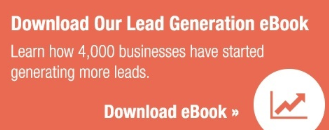 What's worse than losing a lead? Losing a qualified lead, of course.
What's worse than losing a lead? Losing a qualified lead, of course.
By their very definition, qualified leads are more inclined to convert. They align with your buyer personas. They've already familiarized themselves with your brand. And in some particularly painful instances, they've proactively reached out to your sales team.
When qualified leads fail to convert, you as a marketing manager need to ask what, exactly, went wrong, and what can be done to minimize qualified lead drop-off in the future. Or, to frame this question another way, you may be losing qualified financial leads if….
You're not segmenting your lists. An unsegmented, one-size-fits-all approach to financial lead generation fails to acknowledge that every lead has their own unique interests. Web analytics may suggest, for example, that a lead spent a good deal of time on your online "retirement calculator" page. By pushing related content or offers like a free retirement consultation, it tells the lead that you're attuned to their needs and makes them more likely to convert.
You're "attracting" when you should be "converting" and "closing." Qualified leads trust your brand far more than unqualified ones. As a result, dial back the techniques that generally attract leads (blogs, keywords) and ratchet up the techniques that help to convert and close (forms, CTAs, landing pages, blasts.)
Your conversion tools are poorly designed. Are your calls to action visually appealing, well written, and linked to an intuitive landing page? Does the landing page itself provide the reader the promised deliverable with minimal friction? Do your forms capture the optimal amount of lead information? If these tools for conversion are poorly constructed, qualified leads can easily fall through the cracks and sabotage your financial lead generation efforts.
You're not newsjacking. Leads can get tired of the same old sales push. Marketers who successfully newsjack content can impress leads and move them through the purchasing funnel. For example, we dug up an interesting anecdote in which a financial services firm noticed on Twitter that a company in Atlanta offered pension buyouts to 20,000 of its employees.
The advisor wisely saw this as an opportunity to reach out to employees and suggest whether accepting the buyout was a good idea. Rather than cold call the employees, the firm launched a targeted advertising campaign on Facebook, Twitter, and Linkedin, focusing on employees at the company who lived in the Atlanta area and were over the age of 50. The advisor spent $700 on the effort, generated 900 clicks, 65 phone calls, and 25 qualified prospects.
You're not paying for ads. Like it or not, it's becoming harder for firms to generate organic leads, much less convert them, on platforms like Facebook at minimal or no cost. As the aforementioned case study illustrates, paying for ads on social media can deliver a powerful return on investment.
What do you think? What are other ways firms can lose qualified leads? Or to look at it the other way, what's the most effective way to convert qualified leads? Has paid social media ads proven particularly effective in this regard?
Looking to generate more financial leads? Download our Lead Generation eBook





